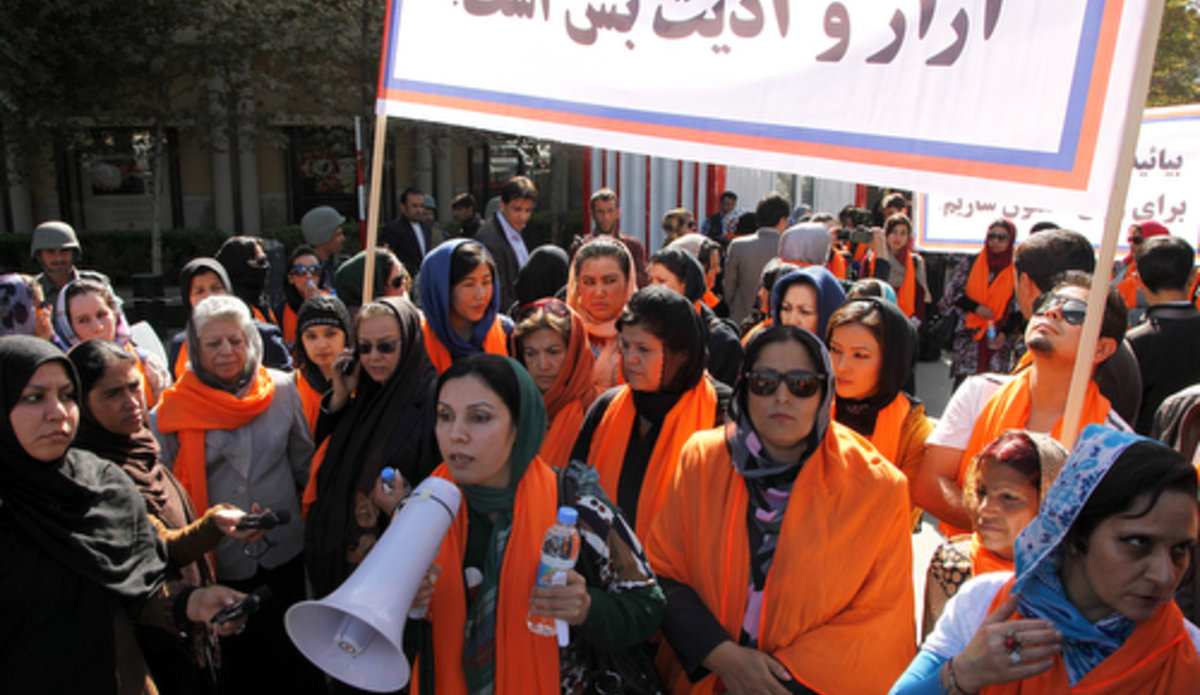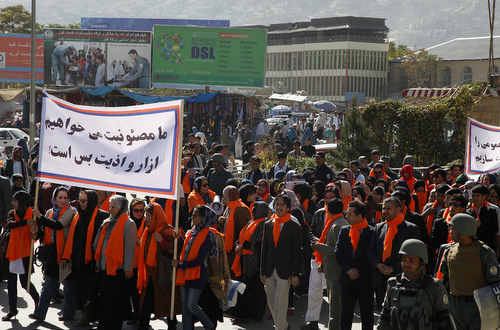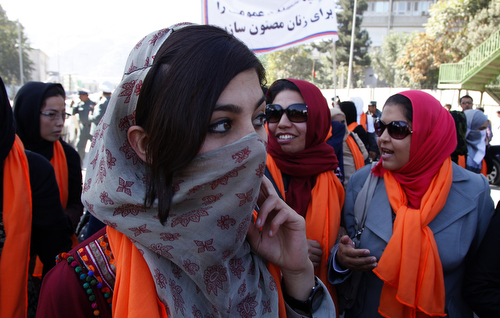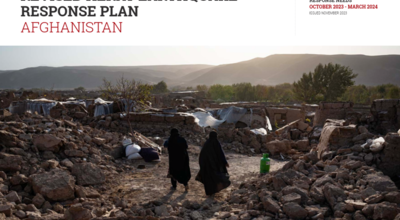Activists march in Afghan capital demanding an end to sexual harassment and violence against women
KABUL - Over 200 women’s rights and civil society activists marched today in one of the busiest and most crowded areas of the capital, Kabul, to raise awareness about sexual harassment and other forms of sexual violence against women and girls in public places.
The participants of the march – organized as part of Secretary-General Ban Ki-moon’s UNiTE to End Violence against Women campaign which proclaimed 25th of every month as ‘Orange Day’ last year – wore orange scarfs around their neck and carried banners with messages to keep public places safe for women and girls.
Addressing the gathering, Roshan Mashal of the Afghan Women’s Network (AWN), which co-organized the march together with a number of United Nations agencies, said young women and girls are usually harassed by men in public places, preventing a majority of the womenfolk from carrying out their daily work.
“We are trying to create awareness among the people through this march that women are part of this society and they have equal rights to play their role in all fields of life for the development of the Afghan society,” said Ms. Mashal.
The theme of the march – organized jointly by AWN, the UN Entity for Gender Equality and the Empowerment of Women (UN Women), the UN Human Settlements Programme (UN Habitat) and the UN Development Programme (UNDP) – was “Safe Spaces for Women and Girls.” It was supported by the Afghan Ministry of Women’s Affairs and the Kabul Municipality.
The orange scarfs worn by the marchers symbolized the “Orange Day” and chanted slogans such as ‘streets are also my share,’ ‘we want social justice,’ ‘stop street violence,’ ‘no to violence” and “yes to equality.”
A participant of the march and a civil society activist, Zahra Sepehr, said that street violence against women and girls is an issue in Afghanistan, which is not given enough attention.
“Through this march, we are trying to break the wrong customs that prevent and limit women’s role in the society,” said Ms. Sepehr.
A joint news release issued by UN Women, UN-Habitat, UNDP and AWN on the eve of the march said sexual harassment and other forms of sexual violence in public spaces was unfortunately an everyday occurrence for women and girls around the world and was “a serious concern” in Afghanistan.
“We call upon the Afghan Government and other stakeholders to improve the established environment so that women can get access to benefits, services and opportunities otherwise denied to them. When women can safely occupy public spaces they can safeguard their personal dignity, and participate as equal citizens in the society and political life of their communities,” said the UN Women Country Representative, Ingibjorg Gisladottir, in the news release.
Similarly, in his message on the Orange Day, the acting UNDP Country Director, Yuxue Xue, highlighted the need for intensified efforts to increase investments in gender empowerment at every level in Afghanistan.
The UN-Habitat Country Representative, Peter Dalglish, strongly urged “all urban dwellers, including men, and particularly local government leaders, to recognize the importance of building and maintaining urban public spaces that empower women to meaningfully participate in public life free from fear and harassment.
In her message, the Director of AWN, Hasina Safi, said, “The real peace comes when women can fully participate in social life and access resources without any fear. We need to make our environment a place free of violence, harassment and discrimination.”
The Secretary-General’s UNiTE Campaign focuses its Orange Day activities on highlighting recommendations made at the 57th session of the UN Commission on the Status of Women (CSW57) which took place in March this year to which Afghanistan is a party.
“At this session, governments made specific commitments directed towards making public spaces safer for women and girls,” added the news release.
 UN
UN












